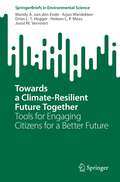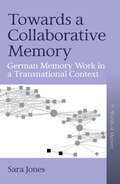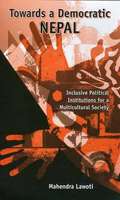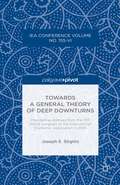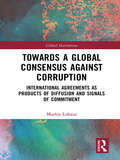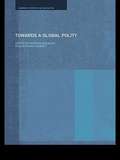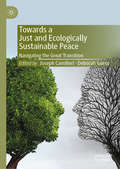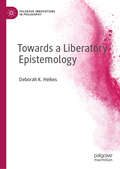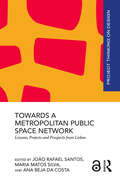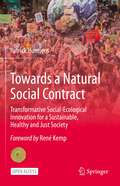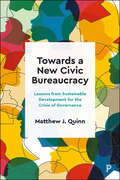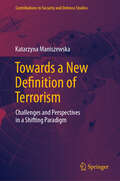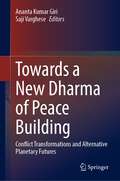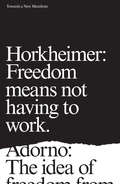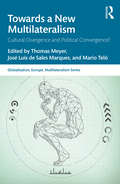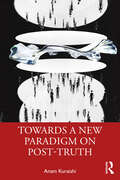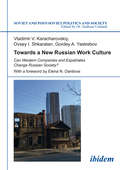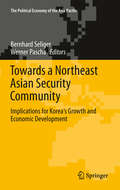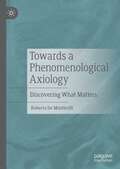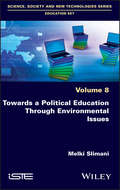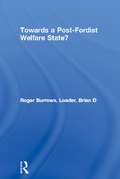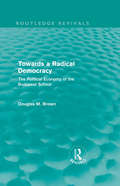- Table View
- List View
Towards a Climate-Resilient Future Together: Tools for Engaging Citizens for a Better Future (SpringerBriefs in Environmental Science)
by Mandy A. van den Ende Arjan Wardekker Dries L.T. Hegger Heleen L.P. Mees Joost M. VervoortAlthough many local authorities underline the important role of citizens in climate adaptation, many experience difficulties with organizing citizen participation in a way that is meaningful to both citizens and policymakers. Climate change is for many simply not a top priority. Besides, the future is often rather abstract to people, citizens in particular. We argue that practical tools are needed to help citizens structure the process of thinking about and designing the future of their living environment under the impacts of climate change. The toolbox Towards a climate-resilient future together offers practical foresight methods and tools for organizing citizen participation in the process of building climate-resilient futures. It provides an overview of the state the art of and hands-on guidance for executing participatory foresight methods and showcases some of the lessons learned from several international research programs on citizen engagement. In doing so, the toolbox can assist practitioners, students and academics concerned with the question of how local communities in urban and rural areas could adapt to climate change impacts and become more resilient in the future. It is suitable for readers without any experience in citizen participation and/or foresight, while more experienced readers will find innovative combinations of methods and tools that are unique within the field of citizen participation and foresight..
Towards a Collaborative Memory: German Memory Work in a Transnational Context (Worlds of Memory #9)
by Sara JonesFocusing on the memory of the German Democratic Republic, Towards a Collaborative Memory explores the cross-border collaborations of three German institutions. Using an innovative theoretical and methodological framework, drawing on relational sociology, network analysis and narrative, the study highlights the epistemic coloniality that has underpinned global partnerships across European actors and institutions. Sara Jones reconceptualizes transnational memory towards an approach that is collaborative not only in its practices, but also in its ethics, and shows how these institutions position themselves within dominant relationship cultures reflected between East and West, and North and South.
Towards a Constitutional Charter for Canada
by Albert S. AbelIn this timely book, edited from a manuscript left unfinished at his death, one of Canada's leading constitutional scholars presents his prescription for constitutional change. The book diagnoses the failure of Canada's present constitution, both in dealing with the country's distinctive characteristics--regional identity and regional disparity--and in providing for effective national economic management. Drawing upon comparisons with other federal constitutions and with the European Economic Community, it proposes a new constitutional charter which would shift important responsibilities to the provinces while strengthening the economic powers of the central government. Specific recommendations are set out for a provincial residuary power, restructured taxing and spending powers, and a Canadian Equalization Council--the last a unique redistributive mechanism designed to ensure that residents of every province have access to adequate government services. Throughout, the plan pays close attention to the need to formulate constitutional provisions in a way which protects them against distortion by subsequent interpretation. At a time when the need for solutions to Canada's constitutional problems has never been more pressing, Albert Abel's is a particularly valuable individual contribution to the Canadian constitutional debate.
Towards a Democratic Nepal
by Mahendra LawotiThis book analyses the problem of the increasing political exclusion of ethnic, caste and gender groups in democratic Nepal and discusses its consequences for democracy and the stability of the country. While outlining alternative democratic institutions and proposing specific institutions that can include the diverse socio-cultural groups in Nepal, this book: - analyses the Maoist insurgency, arguing that political exclusion was a major cause for its genesis and growth; - examines the causes for the lack of democratic consolidation in Nepal; - provides the first comprehensive critique of the 1990 Constitution, identifying it as an important factor leading to the political exclusion of ethnic groups; - suggests the setting up of a new Constituent Assembly to address the social and political crisis in Nepal; - makes important recommendations to shape an inclusive and democratic Nepal which include federalism; a powerful House of Nationalities; a proportional electoral system; affirmative action policies and reservations; declaration of a secular state; a centralized judicial review; and the protection of minority rights in the Constitution. Overall, the author argues that unless Nepal's ruling elite becoms senstive to the needs of marginalized and excluded groups, the country could witness an escalation in violence. Highlighting a wide range of issues crucial to strengthening democracy in Nepal, this book is of interest ot students and academics studing Nepal and South Asia.
Towards a Francophone Community
by Robin S. GendronUsing extensive archival research, Gendron rebuts the argument of Quebec nationalists and scholars that the Canadian government's neglect of French Africa forced Quebec to develop its own international identity. Towards a Francophone Community shows that there had been active federal interest in French African affairs since the late 1940s, within the context of developments in NATO and the Cold War, the vagaries of Canada's relations with France, and the Quiet Revolution in Quebec.
Towards a General Theory of Deep Downturns: Presidential Address from the 17th World Congress of the International Economic Association in 2014 (International Economic Association Series)
by Joseph E. StiglitzJoseph Stiglitz examines the theory behind the economic downturns that have plagued our world in recent times. This fascinating three-part lecture acknowledges the failure of economic models to successfully predict the 2008 crisis and explores alternative models which, if adopted, could potentially restore a stable and prosperous economy.
Towards a Global Consensus Against Corruption: International Agreements as Products of Diffusion and Signals of Commitment (Global Institutions)
by Mathis LohausCorruption has long been identified as a governance challenge, yet it took states until the 1990s to adopt binding agreements combating it. While the rapid spread of anti-corruption treaties appears to mark a global consensus, a closer look reveals that not all regional and international organizations move on similar trajectories. This book seeks to explain similarities and differences between international anti-corruption agreements. In this volume Lohaus develops a comprehensive analytical framework to compare international agreements in the areas of prevention, criminalization, jurisdiction, domestic enforcement and international cooperation. Outcomes range from narrow enforcement cooperation to broad commitments that often lack follow-up mechanisms. Lohaus argues that agreements vary because they are designed to signal anti-corruption commitment to different audiences. To demonstrate such different approaches to anti-corruption, he draws on two starkly different cases, the Organization of American States and the African Union. Contributing to debates on decision-making in international organizations, this work showcases how global governance is shaped by processes of diffusion that involve state and non-state actors. The book highlights challenges as well as chances linked to the patchwork of international rules. It will be of great interest to students and scholars of IR theory, global governance, international organizations and regionalism.
Towards a Global Polity: Future Trends and Prospects (Warwick Studies In Globalization Ser.)
by Richard Higgott Morten OugaardWhile 'one world government' is not on the cards, the globalization of political life has progressed significantly over the last decades. Rather than adding to existing theoretical frameworks such as the realist picture of international anarchy or the English School'sinternational society this volume starts out from the idea of the world as one
Towards a Just and Ecologically Sustainable Peace: Navigating the Great Transition
by Deborah Guess Joseph CamilleriThis book addresses the need to develop a holistic approach to countering violence that integrates notions of peace, justice and care of the Earth. It is unique in that it does not stop with the move toward articulating ‘Just Peace’ as a human concern but probes the mindset needed for the shift to a ‘Just and Ecologically Sustainable Peace’. It explores the values and principles that can guide this shift, theoretically and in practice. International in scope and grounded in the reality of Indigenous and non-Indigenous Australia and the wider Asia-Pacific context, the book brings together important insights drawn from the Indigenous relationship to land, ecological feminism, ecological philosophy, the social sciences more generally, and a range of religious and non-religious cosmologies. Drawn from diverse disciplinary backgrounds, the contributors in this book apply their combined professional expertise and active engagement to illuminate the difficult choices that lie ahead.
Towards a Liberatory Epistemology (Palgrave Innovations in Philosophy)
by Deborah K. HeikesThis book offers a compelling examination of our moral and epistemic obligations to be reasonable people who seek to understand the social reality of those who are different from us. Considering the oppressive aspects of socially constructed ignorance, Heikes argues that ignorance produces both injustice and epistemic repression, before going on to explore how our moral and epistemic obligations to be understanding and reasonable can overcome the negative effects of ignorance. Through the combination of three separate areas of philosophical interest- ignorance, understanding, and reasonableness- Heikes seeks to find a way to correct for epistemological and moral injustices, satisfying needs in feminist theory and critical race theory for an epistemology that offers hope of overcoming the ethical problem of oppression.
Towards a Metropolitan Public Space Network: Lessons, Projects and Prospects from Lisbon (Project Thinking on Design)
by Maria Matos Silva João Rafael Santos Beja da Costa, AnaThis book explores the hypothesis that public space – if conceptualised, imagined, and shaped at the metropolitan scale, through innovative territorial design approaches – offers the possibility to interconnect and integrate various systems in search for synergic responses to emerging societal challenges that impact large, urbanised landscapes.The book offers a multidimensional and multi-geographic framework to discuss the role of public space on contemporary metropolitan territories, as part of MetroPublicNet - Building the foundations of a Metropolitan Public Space Network to support the robust, low-carbon and cohesive city: Projects, lessons, and prospects in Lisbon research project. The reader will find a critical and overarching perspective on the conceptual, methodological, and empirical lenses that unfolded throughout the research process, namely a systematised decoding of the public space projects, policies, and rationales that shaped the recent transformation of Lisbon Metropolitan Area. With a diverse range of authors actively engaged in academic research and professorship, in design practice, and in policy-oriented roles, the book concludes with the outlining of forward-looking guidelines, policy recommendations, and design experimentations. This book will be of interest to researchers and students of architecture, urbanism, landscape architecture and geography.
Towards a Natural Social Contract: Transformative Social-Ecological Innovation for a Sustainable, Healthy and Just Society
by Patrick HuntjensThis open access book states that the societal fault lines of our times are deeply intertwined and that they confront us with challenges affecting the security, fairness and sustainability of our societies. The author, Prof. Dr. Patrick Huntjens, argues that overcoming these existential challenges will require a fundamental shift from our current anthropocentric and economic growth-oriented approach to a more ecocentric and regenerative approach. He advocates for a Natural Social Contract that emphasizes long-term sustainability and the general welfare of both humankind and planet Earth. Achieving this crucial balance calls for an end to unlimited economic growth, overconsumption and over-individualisation for the benefit of ourselves, our planet, and future generations. To this end, sustainability, health, and justice in all social-ecological systems will require systemic innovation and prioritizing a collective effort. The Transformative Social-Ecological Innovation (TSEI) framework presented in this book serves that cause. It helps to diagnose and advance innovation and spur change across sectors, disciplines, and at different levels of governance. Altogether, TSEI identifies intervention points and formulates jointly developed and shared solutions to inform policymakers, administrators, concerned citizens, and professionals dedicated towards a more sustainable, healthy and just society. A wide readership of students, researchers, practitioners and policy makers interested in social innovation, transition studies, development studies, social policy, social justice, climate change, environmental studies, political science and economics will find this cutting-edge book particularly useful.“As a sustainability transition researcher, I am truly excited about this book. Two unique aspects of the book are that it considers bigger transformation issues (such as societies’ relationship with nature, purpose and justice) than those studied in transition studies and offers analytical frameworks and methods for taking up the challenge of achieving change on the ground.”- Prof. Dr. René Kemp, United Nations University and Maastricht Sustainability Institute
Towards a New Civic Bureaucracy: Lessons from Sustainable Development for the Crisis of Governance
by Matthew J. QuinnIn this timely analysis, Matthew J. Quinn plots a landmark reimagination of governance and public administration, underpinned by sustainable development and civic republicanism. He draws on governance literature and Foucault’s concept of governmentality to demonstrate the anachronism of existing bureaucratic norms and how these have thwarted sustainability and fuelled right-wing populism. Using international examples and the author’s own extensive experience in sustainability governance as a senior UK official, the book proposes a new civic bureaucracy which fosters societal engagement and dialogue. It sheds new light on debates about the emerging crisis of governance, the role of public bureaucracy and the means to embed sustainability in governance.
Towards a New Definition of Terrorism: Challenges and Perspectives in a Shifting Paradigm (Contributions to Security and Defence Studies)
by Katarzyna ManiszewskaThis book addresses critical questions in the field of terrorism studies that have long eluded consensus in the international community. It discusses why there is an abundance of definitions of terrorism and, on the other hand, the absence of a standard definition of terrorism reflected at the international level, shedding light on the elusive boundaries for achieving a global consensus. The book's two compelling hypotheses pave the way for a fresh perspective on counterterrorism efforts. Firstly, the need for new legal frameworks that adapt to the evolving nature of terrorism, encompassing state-sponsored terrorism. Secondly, by examining the historical roots of terrorism, this book uncovers patterns that could reshape future counterterrorism strategies. Drawing on interviews with 20 leading experts in terrorism studies from diverse backgrounds and regions, this book provides invaluable insights and ensures a well-rounded examination of the subject. It will appeal to students, scholars, and researchers of security studies, political science, international relations, and terrorism studies in particular, as well as policy-makers interested in exploring the complexities of countering terrorism in our ever-changing world.
Towards a New Dharma of Peace Building: Conflict Transformations and Alternative Planetary Futures
by Ananta Kumar Giri Saji VargheseThis volume deals with a new Dharma of peacebuilding and conflict transformations, drawing on the world's philosophical, religious, and spiritual traditions and many recent initiatives and experiments with peace. It deals with issues of sustainable peace, Dharma and Ubuntu of peace from African traditions, neurological insights of peacebuilding, traditions of conscientious objection, Satyagraha, possibilities of Gandhian Ahimsa, and moral and ethical limits of conflict and conflict resolution. It also presents the works of peace thinkers and activists such as Spinoza, Abhinavagupta, Tolstoy, Gandhi, Ulrich Beck, and others. It offers new initiatives and experiments in peace in different parts of the world—Palestine-Israel, Colombia, the Middle East, India, and South Africa. This pioneering and handy book is of interest to students, scholars, teachers, and activists working in peace and conflict studies, development studies, cultural studies, and religious studies as well as in different civil society organizations around the world.
Towards a New Manifesto
by Max Horkheimer Theodor AdornoA thrilling example of philosophy in action, Towards a New Manifesto reveals the fathers of critical theory, Adorno and Horkheimer, in a uniquely spirited and free-flowing exchange of ideas.A record of their discussions over three weeks in the spring of 1956, recorded with a view to writing a contemporary version of The Communist Manifesto, this conversation ranges across its central themes--theory and practice, labor and leisure, domination and freedom--in a register found nowhere else in their work. Amid a careening flux of arguments, aphorisms and asides, in which the trenchant alternates with the reckless, positions are swapped and contradictions unheeded resulting in a thrilling example of philosophy in action and a compelling map of a possible passage to a new world.
Towards a New Multilateralism: Cultural Divergence and Political Convergence? (Globalisation, Europe, and Multilateralism)
by Thomas Meyer Mario Telò José Luís De Sales MarquesThis edited book focuses on the dynamic balance between global cultural diversity and multilateral convergence in relevant policy areas that involve actual and potential policy convergences (and divergences): the environment, trade, peace and security, and human rights. It offers theoretical reflections about the impact of the concept of multiple modernities on new ideas, cultural backgrounds, and/or national or regional particularities. An interdisciplinary team of authors combines comparative policy analysis with theoretical dialogue about the conceptual, institutional, normative, and political dimensions of a new kind of multilateral cooperation. Finally, the book concludes that by stimulating an intercultural dialogue which goes beyond a mere "rational choice" approach, we can foster progress through a better understanding of the opportunities and limitations offered by a pluralist, varied, post-hegemonic, and multilayered form of multilateral cooperation. This book will be of key interest to scholars and students of European/EU studies, economics, human rights, climate change, history, cultural studies, international relations, international political economy, security studies, and international law.
Towards a New Paradigm on Post-truth
by Anam KuraishiThis book reconceptualises the idea of “post-truth”. It does not limit the domain of post-truth to the production factories of fake news. Drawing on examples such as Trump, War on Terror, anti-vaccination, climate change denial, denial of scientific facts about smoking, and so forth, it analyses the concept through a new theoretical lens which focuses on the specificity of post-truth discourses. Further, the volume develops a guide to operationalise post-truth discourse and makes use of Pakistan as a case study to illustrate post-truth discourses in Pakistani newspapers and implements an experiment to measure the effects of post-truth rhetoric on political attitudes.The volume will be essential reading for students, scholars, and researchers of media and communication studies, politics, and South Asian studies.
Towards a New Russian Work Culture: Can Western Companies and Expatriates Change Russian Society? (Soviet and Post-Soviet Politics and Society #157)
by Ovsey Shkaratan Vladimir Karacharovskiy Gordey YastrebovThis innovative book offers a fresh perspective on the national work culture of Russia and the substantial role foreign institutional and cultural impact has had in shaping it. Russia's contemporary work culture is understood as a national system supplemented by new values and attitudes that have been adopted through the mediation of foreign individuals and corporations or in response to the challenges of Western competition. The book argues that the foreign factor triggers change in the landscape of Russia's work culture, the scope of which depends on the type of influence. However, there is a certain core of the work culture that remains resistant to any external impact.
Towards a Northeast Asian Security Community
by Bernhard Seliger Werner PaschaThe Northeast Asian security environment is closely linked to Korea's growth perspectives for the future. The spectacular rise of the South Korean economy in the past half century, also known as "Miracle on the Han River," has been duly highlighted as one of the most successful cases of economic development worldwide. However, among the factors curbing South Korea's growth perspectives has been, from the very beginning of its rise, the coexistence of the difficult neighbour to the North, Democratic People's Republic of Korea. While in the cold war this coexistence has been taken as inevitable, after the end of the cold war there were hopes to overcome this obstacle to further growth either through collapse or enhanced cooperation with the North, neither of which became reality. North Korea's unprecedented aggressiveness and development of long-range ballistic missiles and nuclear devices, made this threat truly an international question with multilateral talks coming into existence as ad-hoc measures to cope with the nuclear crisis. It was then that the idea of a Northeast Asian Security Community was born. The contributions in this book discuss how a peaceful solution of the security problems could not only enhance stability of Korea's economy and reduce the defense burden considerably (the so-called peace dividend), but would facilitate regional investments safer and regional solutions for common economic problems. When discussing the possibilities of a security framework or, in an institutionalized form, security community, in Northeast Asia, the authors in this volume are realistic as to not fall into the trap of wishful thinking, which so often has characterized approaches to North Korea resulting in disappointment. The past two years again saw the rising of tensions in Northeast Asia and the masterful way in which even an impoverished and isolated country can play its cards. While it seems a new ice age between the two Koreas is possible, nevertheless and maybe even more than ever the search for a stable security framework for Northeast Asia as a precondition for peaceful economic cooperation and development will go on. The chapters in this volume contribute to the ongoing debate to secure peace and development in Northeast Asia, making this book of interest to both academics and policy-makers alike.
Towards a Phenomenological Axiology: Discovering What Matters
by Roberta De MonticelliThis book attempts to open up a path towards a phenomenological theory of values (more technically, a phenomenological axiology). By drawing on everyday experience, and dissociating the notion of value from that of tradition, it shows how emotional sensibility can be integrated to practical reason. This project was prompted by the persuasion that the fragility of democracy, and the current public irrelevance of the ideal principles which support it, largely depend on the inability of modern philosophy to overcome the well-entrenched skepticism about the power of practical reason. The book begins with a phenomenology of cynical consciousness, continues with a survey of still influential theories of value rooted in 20th century philosophy, and finally offers an outline of a bottom-up axiology that revives the anti-skeptical legacy of phenomenology, without ignoring the standards set by contemporary metaethics.
Towards a Political Education Through Environmental Issues
by Melki SlimaniThe growing field of political education through environmental issues is organized around processes, which reach beyond the formal ones found in academic disciplines and national curricula into informal processes (such as social mobilization) and nonformal processes (such as those found in various international educational recommendations). Using theoretical approaches from the fields of political philosophy and the social sciences, this book develops a simultaneously conceptual and analytical framework for the political in educational content involving environmental issues. This framework is then used to empirically analyze educational content on sustainable development formulated by UNESCO, as well as the Tunisian curriculum. The theoretical and empirical studies carried out in this book lead to proposed curriculum tags for political education through environmental issues, with the intent of opening this field to inclusion in the didactics of curriculum research.
Towards a Post-Fordist Welfare State? (The\state Of Welfare Ser.)
by Roger Burrows Brian D LoaderThere is no doubt that significant socio-economic changes have occurred over the last twenty years in the UK and other advanced capitalist societies. Consequently, Fordism, a bureaucratic, hierarchical model of industrial development has matured into Post-Fordism, with its greater emphasis on the individual, freedom of choice and flexibility, generating fresh debate and analysis. Towards a Post-Fordist Welfare State represents leading authors from a number of disciplines - social policy, sociology, politics and geography - who have played a key role in promoting and criticising Post-Fordist theorising and presents a thorough examination of the implications of applying Post-Fordism to contemporary restructuring of the British welfare state. The work will appeal to a wide-ranging readership providing the first social policy text on Post-Fordism. It will be key reading for undergraduates, postgraduates and lecturers in social policy and administration, sociology, politics and public sector economics
Towards a Principal-Agent Based Typology of Risks in Public-Private Partnerships
by Luc Leruth André De Palma Guillaume PrunierA report from the International Monetary Fund.
Towards a Radical Democracy: The Political Economy of the Budapest School (Routledge Revivals)
by Douglas BrownOriginally published in 1988, this is the first systematic account of the writings of Hungarian dissidents and former students of George Lukacs, collectively known as the 'Budapest School'. Dr. Brown demonstrates the importance of their work in contributing to a logically consistent yet realistic theory of socialist mixed economies, and genuine radical democracies. The Budapest Schoool's model of radical democracy represents a critique of both industrial capitalism and existing socialist systems, with immediate political as well as philosophical importance. Dr. Brown is particularly concerned to draw out its significance for the practical realities of political economy, and the logical implications for desirable reform of Western mixed economies.
